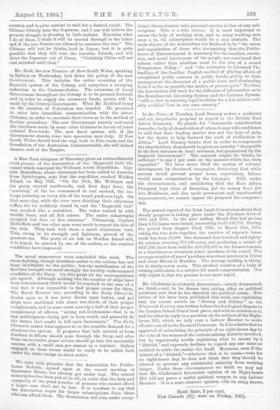Mr. Gladstone is evidently determined,—wisely determined, we think,—not to be
drawn into taking sides on political questions now that he has deserted the political arena. Two letters of his have been published this week, one explaining that his recent article on "Heresy and Schism" in the Nineteenth Century was written before the theological dispute in the London School Board took place, and with no relation to it, and the other in reply to a question on the subject of the Eight- hours Bill, which we defy even a Labour Member to make effective use of in the House of Commons. In it he admits that he approved of submitting the principle of an eight-hours day to the vote of the miners of the various mining districts involved, but he ingeniously avoids explaining what be means by a "district," and expressly declines to regard any one mine as entitled to settle the matter for itself. Moreover, even if the miners of a "district,"—whatever that is to mean,—vote for an eight-hours day, he does not think that they should be allowed to prevent any substantial minority from working longer. Under these circumstances we think we may say that Mr. Gladstone's favourable opinion of an Eight-hours Bill will not prove a useful political weapon to any Labour Member. It is a mere abstract opinion, with its sting drawn.


































 Previous page
Previous page